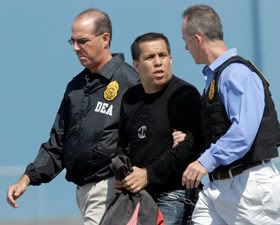Libre comercio de rufianes.
 The Americas |
| May 15th 2008,BOGOTÁ From The Economist print edition Free trade in thugs Colombia's paramilitaries. Getting tougher with right-wing warlords |
 |
| Relocating his business to the United States? AP. |
IN A surprise move on May 13th, President Álvaro Uribe announced the extradition to the United States of 14 of Colombia's most notorious paramilitary warlords on drug-trafficking charges. As well as sending a warning to other right-wing paramilitaries, the aim is to show Democrats in Washington that Mr Uribe means what he says about breaking with paramilitary groups who continue to murder trade unionists and other left-wingers. Democratic congressional leaders and their trade-union allies have cited those murders as a reason for their refusal to approve a free-trade agreement with Colombia. Mr Uribe may also be hoping to boost his already soaring approval ratings to strengthen his hand in an eventual bid for an unprecedented third term as president. More than two terms in a row are currently banned by the constitution, so this would require approval by Congress. Mr Uribe's move could backfire. Human-rights groups fear that it will rob the victims of the compensation that they are entitled to from their tormentors, and could also remove the evidence needed for a successful investigation into why Colombia's paramilitaries and their political accomplices have hitherto enjoyed impunity. More than 60 congressmen, most allies of Mr Uribe, are either already in prison or under investigation in Colombia for alleged links to paramilitaries. Last month, Mario Uribe, the president's cousin and close political ally, was arrested. "The good news is that these paramilitary bosses could now face serious jail time," said José Miguel Vivanco, Americas director of Human Rights Watch, a lobbying group. (In the United States, cocaine dealers can get 30 years or more.) "The bad news is they may no longer have any reason to collaborate with Colombian prosecutors investigating their atrocities...Just as local prosecutors were beginning to unravel the web of paramilitary ties to prominent politicians, the government has shipped the men with the most information out of the country," he lamented. In fact, the United States has agreed to allow Colombian prosecutors continued access to the extradited men. They have also apparently agreed to transfer to Colombia any seized assets or fines imposed on the warlords to compensate more than 100,000 victims who have come forward. Created in the 1980s by wealthy ranchers to protect themselves from attacks by the left-wing FARC guerrillas, the paramilitaries developed into armed gangs, accused of many thousands of killings as well as drug-trafficking and money-laundering. Explaining his decision in a televised address on May 13th, Mr Uribe said the extradited men had violated the conditions of a 2003 pact with the government under which they agreed to surrender to the authorities in exchange for relatively light prison sentencesa maximum of eight yearsand protection against extradition. In return, they had promised to confess to their crimes, cease all illegal activities and use their drug money to compensate the victims of their appalling crimes. But the 14 warlords had continued to run their criminal networks from prison and had failed to pay reparations, Mr Uribe said. If the move was made with one eye on Washington, its timing appears to have been determined by a legal wrangle. Groups representing victims have been fighting to halt the extraditions. This appears to have prompted Mr Uribe's decision to send the paramilitaries to the United States. Colombia's Supreme Court had recently supported these groups, ruling that extraditions of paramilitary bosses should be carried out only after they had confessed to their crimes and paid reparations. But this was overturned by a judicial council last week. Within hours, the first paramilitary leader to be extradited, Carlos Mario Jiménez, alias "Macaco", was on a plane bound for the United States, a journey made a week later by his 14 colleagues. More may follow. |
Open article at "The Economist" Web Site |
Copyright © The Economist Newspaper Limited 2007. All rights reserved. |

0 Comments:
Post a Comment
Subscribe to Post Comments [Atom]
<< Home